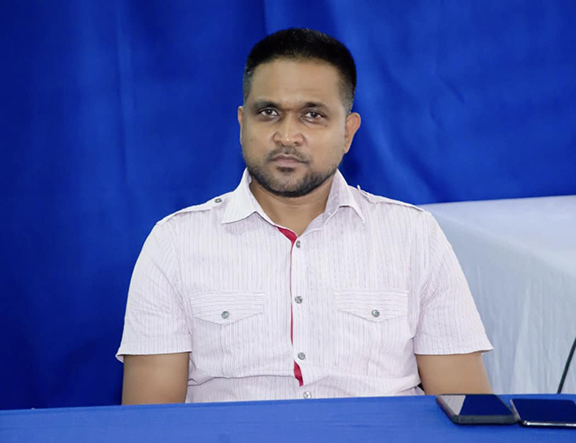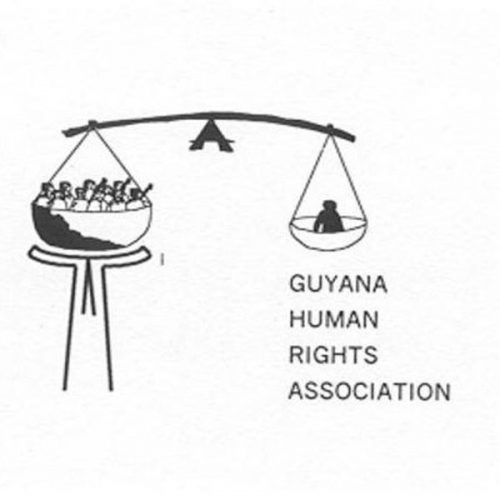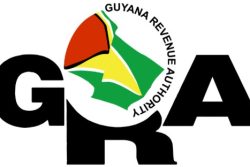Amid escalating revulsion over the apparent collapse of a rape probe against Local Government Minister Nigel Dharamlall, the GHRA yesterday said that `public interest’ demands a trial in the case.
On Friday, the police said that they had gotten a `No Further Action’ statement from the complainant, triggering concerns about the manner and conditions under which the Childcare and Protection Agency (CPA), the Guyana Police Force (GPF) and child non-governmental organisations had handled her case. The role played by the Chambers of the Director of Public Prosecutions has also come under close scrutiny.
In a release, the Guyana Human Rights Association (GHRA) pulled no punches when it stated that the withdrawal of rape allegations by the complainant against Minister Dharamlall was “clearly the end result intended from the outset by his political defenders.”
As such, the human rights body is calling for the implementation of a Safeguarding Policy in every organisation in the country, regardless of how this “saga” turns out.

The release noted that despite the public’s overwhelming negative reaction over the incident, it is forced to conclude that government leaders continue to see nothing in the pattern of Dharamlall’s behaviour that even merits a rebuke. It went a step further to state that this stance “has all the hallmarks of the suspect being in a position to embarrass others if action were taken against him.”
According to the GHRA, police in more professional jurisdictions would not have encouraged the victim to ‘throw in the towel’, and in this case, there is reason to suspect that political action was geared to the exact opposite. “Efforts by the Guyana Police Force to defend its professionalism would be more convincing were they accompanied by a clear explanation of their involvement at every step of the way, particularly the actions of Region Two Police authorities”, the human rights body said.
It added that a professional policing approach to combatting the reality of a victim not wishing to press charges would be to point out that the support from the police remain on offer. It was suggested that the offer can extend to clothes being stored and evidence kept in a freezer in case they change their mind. “The contrasting sad reality in Guyana is that credibility of the engaged agencies is so low, they are reduced to creating a demeaning video of her retraction.”
Lines of enquiry
The release then delved into the process of prosecution. It contended that the Director of Public Prosecutions has two lines of enquiry to pursue in determining whether to lay charges in a case: the first is the reliability and credibility of the evidence collected and handed over by the police. The second consideration, however, relates to whether prosecution of a particular case is in the public interest. It was argued that public interest concerns, as set out in the Code for Prosecutors in Guyana, must take into account such matters as the age of the victim, whether a relationship of trust existed between offender and victim, whether the victim’s race or financial circumstances were relevant. Any evidence of such motivation renders a prosecution more likely. Further, public interest considerations in not holding a trial usually turn on whether the victim would suffer greater harm from a trial.
It also mentioned that a significant stumbling block in the prosecution of rape cases is fear. It includes fear of publicity; fear of impact on marriage prospects; fear the offender will not be found guilty; fear that the police, witnesses and court officials will accept bribes; fear of not being believed; fear rooted in ignorance of the court process; fear of interference with evidence, witnesses and juries; fear rooted in abusers being family or acquaintances; fear of cross-examination; fear of harassment from the perpetrator and his family. Such fears effectively quell momentum for change from the side of the victim. The cumulative effect of fear is trauma primarily in victims, but also in their families and in the larger society, which if untreated by sensitive professional services remains with the victim for life.
As such, the GHRA pointed out, public interest considerations in the Dharamlall case point heavily in support of the need for a trial: “the imbalance in power, the indigenous background and age of the victim together with a prior record of publicized instances of public sexual harassment and humiliation of women all encourage this conclusion.”
It was also stated that sexual assault cases involving young Indigenous girls in Guyana are widespread, systematic and rarely prosecuted, “a conclusion the forthcoming Commission of Inquiry into the Mahdia dormitory fire will likely reveal.”
Political morality
The release also accused the politicians of having a total lack of public interest concerns, charging that the responses of both the President and Vice-President suggested that political morality is irrelevant. Also noted was their failure to condemn the act, suspend or dismiss the Minister and, in addition, demand that the Speaker of Parliament “abandon his spineless dodging when confronted with incidents of sexual harassment in Parliament.” The question was asked, “Were the charges to be dismissed, are the women in Government and the women with whom the Minister interacts on a daily basis expected to treat him as a fit and proper person for public office?”
As far as the association is concerned, if it were the public rather than party interest operating in the political sphere the Minister in question would have gone already. What is deeply concerning to GHRA is the ease with which government leaders tolerate disreputable behaviour, “whether this be Vice News’ allegations of corruption, lucrative jobs for cronies, or the dealings with the United Arab Emirates – among the most disreputable of the Gulf States in matters of sex trafficking and gold smuggling.”
In view of all that has been said, the GHRA posited that the introduction of Safeguarding Policies in every organisation in the country should be the priority response to this incident, noting that such policies are increasingly required in countries where sexual abuse scandals have taken place. The Safeguarding Policy, it explained must be prominently placed and accessible by all staff and visitors. A Safeguarding Officer, whose name is displayed in the Notice, is appointed to manage and enforce the policy and is ring-fenced from retaliatory action. Every governmental, business, sports, religious, NGO, social and educational institutions must conform to the policy or suffer automatic remedial action.
The Government of Guyana’s credibility, particularly its female members, rests on whether they will support implementation of such a policy, the release added.
Meanwhile another NGO, the Amerindian Peoples Association (APA) also expressed deep concern about the recent development in the investigation.
The APA’s tone in a release issued yesterday, was also reproving. The association plainly stated its belief that that the alleged instruction of “no further action” to the police by the child, is a culmination of “improper investigation and systemic emotional abuse” by the authorities. Further, the child’s treatment raises serious questions about the authorities’ interest in delivering justice.
The release expressed the APA’s doubts that the child’s welfare and interests were adequately attended to.
“Over the course of the investigation, we have noted reports of the denial of counsel to the child and the police treating her more like a suspect rather than a victim of a serious crime. The APA is also concerned about the role played by the Welfare Officers of the Childcare and Protection Agency (CPA) in this whole investigation. It is clear, from the press reports, that the child’s interests were not adequately represented by those entrusted to protect her.”
As such, the association is demanding an investigation into the conditions under which the child was being kept and the police’s conduct of the investigation.
Standard operating procedures
Like the GHRA, the APA is less than impressed with the CPA’s handling of the situation especially as it pertains to the child. It therefore called on the Agency to shed light on the following: what were the standard operating procedures (SOPs) employed in addressing the allegations? How many Welfare Officers were assigned to the care of the child? Why was the child denied legal representation by independent attorneys? Did the Childcare and Protection Agency contract any lawyer to provide legal assistance to the child and her family? Was the child isolated from her family and support system? Was mental health care afforded to the child during her stay in the custody of the Agency and if yes, how often? And, how did the Agency ensure that the child’s welfare and her rights were advocated for while being interrogated by the Police?
And the questions did not end there. The APA also took aim at the Guyana Police Force’s conduct which it too felt left a lot to be desired, and as such requested clarity on several troubling issues. What were the SOPs employed in dealing with allegations against Minister Dharamlall – a senior Cabinet member? Was there any confrontation between the child and the accused? And, how often and for what period were the child and her younger sibling interrogated by the police?
The APA also expressed its skepticism at the withdrawal of the allegation. “We view the ‘instruction’ as alleged by the Guyana Police Force to be nothing, but a culmination of the enormous pressures placed on this child and her family.” It noted as well, its concern for the child’s well-being and that of her family. “Allegations of this nature require an enormous amount of strength to be made and we are hopeful that the child is receiving the right mental health and trauma care as this will inevitably shape her future.”
The Association called on Guyanese to ensure “that this matter is not swept under the carpet.” It also called on the Indigenous community to demand that the child is protected, and that the matter be independently investigated, while noting that “the protection of our children should be of paramount importance and value to all.”
The release also challenged the State to uphold its constitutional obligations to protect its citizens, and reminded of ratified documents such as the Convention on the Rights of the Child, particularly Article 34, which speaks to the role of the government in protecting children from sexual abuse. This, it added, must further be informed by General Recommendation No. 39 on the rights of Indigenous women and girls from the Committee on the Elimination of All Forms of Discrimination Against Women. It was explained that the recommendation provides guidance on the obligations of the State to appropriately respond to the sensitive contexts that make Indigenous women susceptible to violence and discrimination at all levels, while reminding that the government has the tools needed to respond to this case in a manner that respects the interests of the child and upholds justice.
The APA declared its intent to continue to fight for the protection of basic human and other indigenous peoples’ rights and its willingness to engage with the United Nations and other regional mechanisms to ensure that justice is served, the release added.








